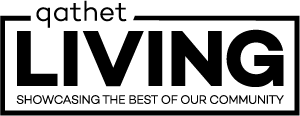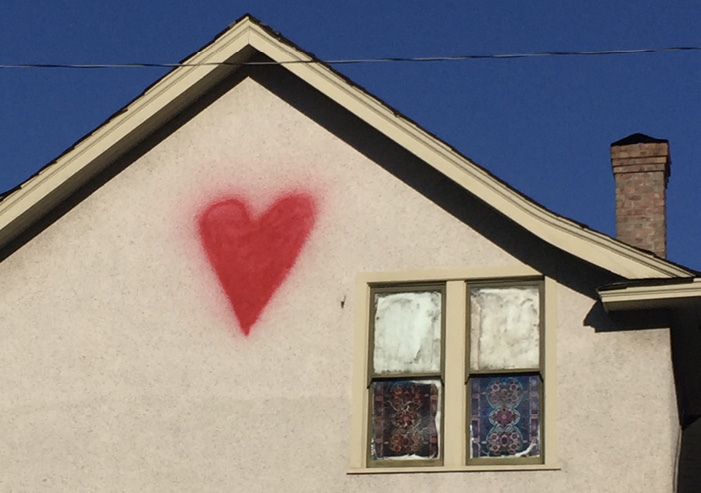If we learn anything from the COVID-19 crisis it will be that humanity is only as strong as our weakest link.
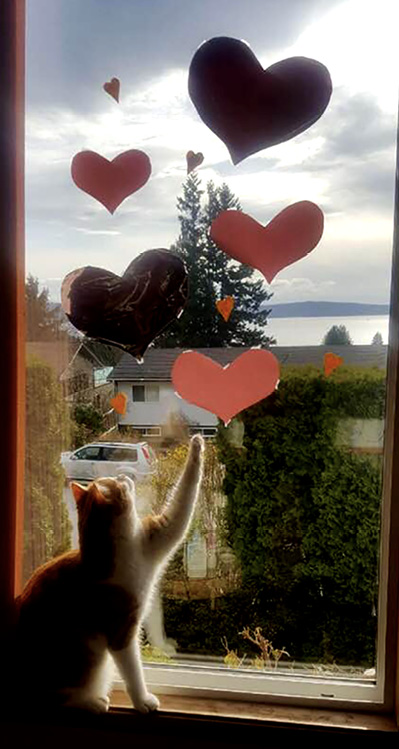
Tammy & Terry Olson’s cat Creamsicle is fascinated with her new window decor. 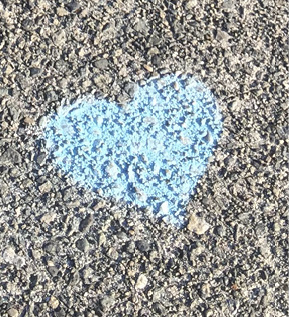
Chalk hearts adorn sidewalks around town. 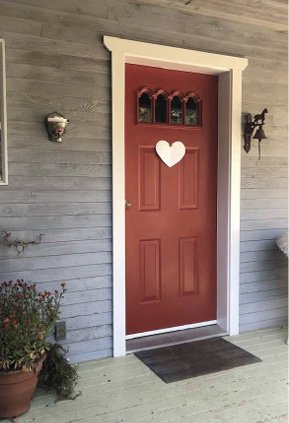
South of town, Jan Padgett shows her love on her red door. 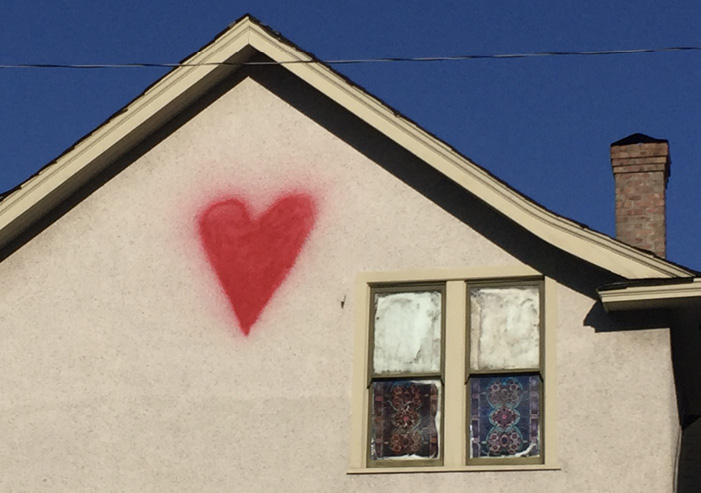
A bold, spray painted heart shines over maple street in the townsite 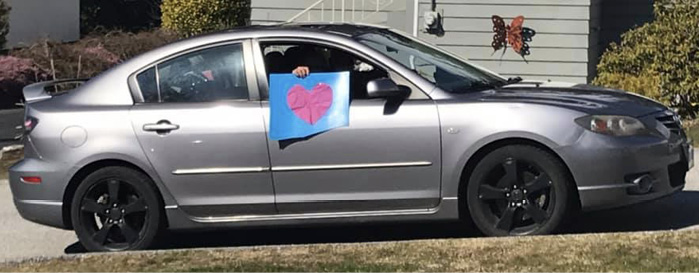
Emily and Guido Sciberras drive by their grandchildren, hanging a heart out their car window.
A SPECIAL MESSAGE FROM PUBLISHER ISABELLE SOUTHCOTT
Our future depends on all of us. How we act now, how we respond collectively will determine the outcome of this pandemic.
Governments around the world are telling people to stay home and only venture out when absolutely necessary. Social distancing is the new norm.
Here in Powell River, all three local governments have asked visitors to stay away for the time being. Don’t even think about taking a day trip to Texada or Savary: you’re not welcome unless you’re a permanent resident. The drawbridge has been raised.
We live in an isolated community accessible by air or boat. A body of water separates us from the lower Sunshine Coast and Vancouver Island while a natural barricade of mountains cuts us off from the rest of BC. Because of this, it is easier for us than others to draw a line refusing all non-essential traffic to our region. This is exactly what our leaders have done.
If you don’t live here, stay home.
If COVID-19 does the same thing here that it did in Italy, it will infect at least a quarter of our population – that’s about 5,000 of qathet’s approximately 20,000 people. Some of those infected will require intensive care.
“If you don’t think that sounds like a lot then consider the fact that roughly five out of every 100 patients will need to be put on a ventilator. While we are trying to get more there are only four ventilators available at our hospital (in Powell River) and two of those are for surgeries,” stated a press release issued by the Powell River Physicians COVID Steering Committee last month.
In Italy, where their entire health care system is collapsing because of the COVID-19 pandemic, doctors have to decide who gets a ventilator and who does not because there aren’t enough ventilators to support the rising number of critical care cases.
We’ve been told what we need to do to flatten the curve so we don’t overwhelm the health system: Keep our distance from others by two metres or six feet, no parties, no coffee dates, no social gatherings.
We need everyone to stay home as much as possible and practice social distancing. We know it’s harder for kids and teens and it could become even harder the longer it goes on. In a column called Damage Control published in the Globe and Mail last month, writer David Eddie said: “Teens, like wolves, are pack animals. Trying to persuade one to enjoy and embrace a period of isolation “as an opportunity” is like placing a plate of kale in front of a shark and urging it to “look upon it as an opportunity to try something new.””
But it simply has to be done.
Wash your hands well (20 plus seconds) and wash them frequently. Disinfect any outside surface (especially public) that you touch. Cell phones included.
When I was a child my father, pediatrician, would tell us to immediately wash our hands when we came in from outside. We were to wash the germs off our hands before doing anything else. Good advice then, even better now.
At the end of December I was invited to a virtual ugly sweater party. I pooh poohed the idea of an online party. “Who would ever go to something like that?” I said scornfully. Three months later, on March 24, I ate my words when I attended my very first virtual birthday party – my own virtual birthday party. Organized by friend Carma Sacree, we had drinks, giggled and caught up using the Zoom videoconferencing tool. I even received a hand-crafted doll called Izzy made by a Lund dollmaker. Although I haven’t touched my gift yet, I witnessed it being unwrapped. It was different but I must admit, it was a lot of fun.
Everyone I talk to is scared. Fear brings out the best in some and the worst in others but most are doing what they can to help. They’re shopping for elderly neighbours and friends who are vulnerable to the virus because of their already-compromised health, they’re running errands and checking in on those who are self-isolating. Our doctors, nurses, paramedics and other health care workers put themselves and their families at risk to care for us when we’re sick. Like us, they’re worried but they have a job to do and they’re doing it. We owe it to them to reduce the risk by practicing social distancing and staying at home as much as possible.
Our essential service workers are still working so society can limp along during this pandemic. Pharmacies and grocery store workers, delivery drivers, pet stores, group homes, daycares, financial institutions, insurance agents, custodial staff, civil servants, local government workers, did I miss anyone? You are all heroes. Thank you.
We need people to look up to. People to give us hope like BC’s provincial health officer Dr. Bonnie Henry and Alberta’s chief medical officer Dr. Deena Hinshaw, who are leading us through this crisis. Dr. Henry has a fan club, and two Victoria women even recorded a tribute to her. Dr. Hinshaw’s face now graces a t-shirt that says: “We’re in this together.” And when she wore a dress with a periodic table print from Smoking Lily in Victoria, BC, the company received an overwhelming number of requests from people wanting to purchase the same dress.
Movie stars, entertainers and top athletes used to be our biggest influencers – fashion and otherwise. Now our medical health officers are.
Life has shifted, values changed. People who grow and sell food, people who provide health care, and people who provide services that support our everyday lives are being thanked like never before.
My partner, Dwain Davis, the meat manager at Mitchell Brothers, says he’s never been thanked so much by his customers. Cards, baking, kind words. A bright yellow poster made by a grateful shopper.
Most people recognize the long hours essential service workers are putting in and are appreciative however there’s always someone who isn’t. I’m disappointed when I see and hear of people being rude because a store has run out of flour or toilet paper. C’mon people! We need to work together; we weren’t prepared for this. Don’t steal masks from hospitals and hand sanitizer from local stores.
United (at a distance) we stand, divided we fall.
COVID-19 is an economic crisis. Many businesses have closed, leaving workers without a paycheque. Governments have initiated supports to help, but this crisis will have long-lasting effects economically.
But first and foremost, this is a public health emergency.
While seniors and those with chronic disease are more vulnerable, people of all ages can get this disease severely, according to the local physicians COVID steering committee. Some of our elderly who lived through the war say what’s happening with supply shortages reminds them of what happened during the war, but most of us have never experienced a society so changed.
I’ve never lived through a state of emergency and I guess many of you haven’t either. We don’t know what will happen next.
We do know that our usual lives have been disrupted. Together we grieve for what we have lost already and what we could lose in the future.
Seniors in care homes and our most vulnerable citizens are at increased risk. My 90-year-old mum’s assisted living home in Comox has been closed to all non-essential visitors since mid-March. She understands but she’s lonely. She’s hard of hearing so I can’t call her but she does email so that’s how we communicate.
I’ve seen other people get creative while visiting family and friends from a distance. They bring musical instruments and play on the lawn, they hold signs up to the window that say: “We love you,” and wave and dance!
If there’s any good to be found during this crisis, it’s in the love we are showing one another.
Defined as caremongering – a movement where people help others in an organized manner – it first showed up on Facebook in mid-March. Facebook groups across the nation began recording the good happenings from Canada’s east coast to Canada’s west coast and all points in between. Here in Powell River, a Facebook group called Hearts from Powell River was launched so people could help others in their community, particularly those who are more at risk of health complications related to COVID-19. The pandemic has led to acts of kindness around the world, from delivering soup to the elderly, to donating fresh oyster mushrooms to the Salvation Army in Powell River, to picking up groceries for a neighbour, to free online fitness, yoga and food-growing classes.
The acts of kindness taking place right now are heartfelt and beautiful. Without them, we’d have no hope and without hope there is nothing. If you have a story to share about an act of kindness shown to you or someone you know, please email isabelle@prliving.ca so we can tell the rest of Powell River about it.
Speaking about kindness, across BC, people are going out on their balconies at 7 pm each night to clap, cheer, and bang pots in a province-wide show of support for health care workers. This nightly gratitude cheer brings neighbourhoods together and as terrifying as this pandemic is, we’re discovering pockets of opportunity in this crisis.
If we use this opportunity to improve the way we communicate with each other, our relationships will be stronger in the future and at least some good will have come out of this nightmare of a crisis.
Stay well, stay kind.
